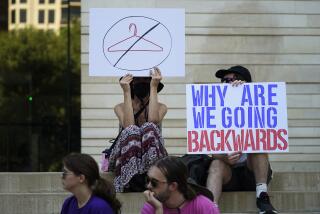Death Penalty Withdrawn in N.Y. Abortion Doctor’s Slaying
- Share via
WASHINGTON — The Justice Department reluctantly agreed Thursday not to seek the death penalty against an abortion foe accused in the notorious sniper slaying of an upstate New York doctor, clearing the way for the onetime fugitive to be extradited from France on murder charges.
French authorities had refused to return James Charles Kopp, arrested in northwest France in March after more than two years at large, unless the United States guaranteed that he would not face execution. France outlawed capital punishment in 1981.
Atty. Gen. John Ashcroft said that after extensive discussions between French and U.S. officials, he saw little choice but to abandon the prospect of a death sentence.
“If the choice is between extraditing Kopp to face these serious charges in a United States court or risking his release by France, the priority must be Kopp’s return,” said Ashcroft, a strong supporter of the death penalty.
No Further Obstacles, Justice Department Says
A French court in Rennes held a hearing on the extradition question Thursday and said it expects a decision at another hearing in three weeks. Justice Department officials said they see no further obstacles to Kopp’s extradition and expect the court to move for his return to the United States to face charges that could put him in prison for the rest of his life.
Kopp, an ardent opponent of abortion, is accused of shooting to death Barnett Slepian, a well-known obstetrician-gynecologist who provided abortions in the Buffalo area, as Slepian stood in his kitchen one evening in 1998. Kopp was allegedly hiding in Slepian’s backyard with a sniper rifle as the doctor returned home with his family from Sabbath services at his synagogue.
An international manhunt ensued, and Kopp was put on the FBI’s “Ten Most Wanted Fugitives” list in 1999.
After weeks of surveillance, authorities nabbed the 46-year-old suspect outside a post office in the French town of Dinan, where he had gone to pick up a package containing $300 mailed by a New York couple.
He is also considered a possible suspect in several similar attacks on abortion providers in Canada and western New York beginning in 1993.
For Ashcroft, the sensitive negotiations over Kopp’s extradition marked the latest in a series of high-profile cases that have tested his resolve in enforcing the federal death penalty.
Last month, after the discovery of thousands of pages of undisclosed documents in the Oklahoma City bombing investigation, the attorney general decided to postpone the execution of Timothy J. McVeigh, which is now scheduled for Monday.
And earlier this week, Ashcroft declared there was no evidence of racial bias in the federal death penalty system, and he rejected calls for a moratorium from advocates for minorities on death row.
Ashcroft, a lifelong opponent of abortion, has faced repeated questions from women’s rights groups about his commitment to ensuring abortion rights. But in seeking the death penalty for Kopp, he said he wanted to send a strong message that “violence is not the solution” and that he will aggressively enforce federal law designed to protect abortion clinics.
Ashcroft said that he had been working “to ensure the United States’ ability to pursue strong punishment for this terrible crime. I wanted to make sure that our nation would not be constrained by limits placed on Kopp’s extradition by France, preventing us from seeking punishment outlined by our laws and our Constitution, such as the death penalty.”
But the attorney general said that “unfortunately, in order to ensure that Kopp is not released from custody and is brought to justice in America, we have had to agree not to seek the death penalty.”
Defense Fears U.S. Won’t Keep Its Word
The State Department sent French officials a diplomatic note spelling out that pledge, but at Thursday’s hearing in France for Kopp, his defense attorneys questioned whether the United States would keep its word.
“These latest assurances from the American authorities, in the form of a simple letter from the U.S. Embassy in Paris, have no value in terms of administrative law,” said Kopp’s lawyer, Herve Rouzaud-Leboeuf.
Slepian left behind a wife and four sons, now ages 10 to 18. After Kopp’s arrest in March, widow Lynne Slepian told the Buffalo News: “I’d like to see him dead. I’d like to see a slow, painful death. Lethal injection is too good for him.”
But faced with France’s resistance to the death penalty, she added that she would rather see Kopp spend the rest of his life in prison if that were the only way to ensure his return.
Kopp faces both federal and state charges in New York in connection with Slepian’s murder, the use of a firearm and violation of the federal Freedom of Access to Clinic Entrances Act. The federal charges could have subjected Kopp to a possible death sentence if convicted.
More to Read
Sign up for Essential California
The most important California stories and recommendations in your inbox every morning.
You may occasionally receive promotional content from the Los Angeles Times.













